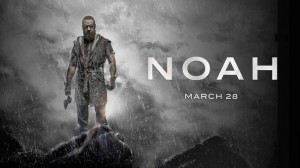I confess, I’m not really much of a movie man.
They are expensive (especially if I take all 7 of the Berrytribe like we do every Christmas). It’s mostly a blind gamble as to their quality, which I can’t afford the time or money to risk too often these days. And, for the most part, they make lousy dates with my wife because you walk out 3 hours later, $30 poorer and not knowing one another any better by the investment. I’d rather go for a walk and grab a meal together.
But that said, I do have movies that I love. Without tainting your opinion of me with those titles, I think their common threads are some combination of these:
- They have a character I want to emulate or be like.
- They often are “based” on a true story or a book that I have read
- They often have at least some comic relief in the drama of the narrative.
So, when I went to see Noah on opening day last Friday with some friends, I think that without saying it, that’s kinda what I was expecting. I’ve read the book and even memorized a few lines from Noah’s story. My favorite is Genesis 6:9. It reads, “Noah was a righteous man, blameless among the people of his time, Noah walked with God.” I wanted that to be true.
I wanted to walk out of the theatre appreciating some of the creative license on plot twists and concepts that might have been true or were within the realm of possible. I wanted to laugh a little. But mostly, I wanted to walk out wanting to be Noah. I wanted to leave the theatre like you do when you leave a great funeral, wanting to emulate the one in whose name we have gathered. I know I didn’t walk the Earth with Noah, but I wanted to feel like I wished I could have been in his family or at least have known him.
But on those notes, this movie fell flat. It left me with a distaste for the character Noah, a silent/ angry/ distant God, and a sense that what I just watched was mythology, not a remake of an ancient truth.
Yet, in spite of that, here’s a few reasons I’d tell you to see it and why I’ll eventually watch it with my own kids so we can wrestle with it:
(warning… might be a movie spoiler or two down here)
IT’S HONEST ABOUT THE UGLINESS OF THIS STORY:
I was the one who decorated our kid’s nursery with cute little animals walking 2 by 2 into the ark. We had several toy play sets and all kinds of stuffed animals for kids to remake the scene with as they moved through their toddler years. I wouldn’t change that…
… but all the Bible stories we tell little kids are age-appropriately edited. At some point, faith development requires you undo that censorship and pull the covers back on the rest of the story. The kids Bible you grew up with was missing some verses to say the least. Think about it: David and Goliath ends with David decapitating Goliath and then carrying his head around all the way to Jerusalem and then displaying Goliath’s weapons like a treasure in his tent. Can you imagine the uproar if the U.S. soldiers did that with Saddam Hussein or Osama bin Laden? Not exactly what we would even call humane treatment of even your enemy.
When the walls of Jericho come down by the power of God, they devote the city to God and then ALL the inhabitants and ALL their livestock are killed by the Israelites. After Elijah defeats the prophets of Baal in an epic showdown with fire from heaven, he has his opponents captured and then slaughtered. Yes, that’s the word the NIV uses to describe it… slaughtered. That definitely never makes it in the picture pop-up Bible.
The truth is: Noah and his family and some animals live, but everyone else dies. EVERYONE else dies. Neither the Bible nor this Movie leave that fact ambiguous. Much like The Passion of the Christ did not hide the blood on the crucifixion, neither does the Noah story hide the death and destruction the flood caused. In fact, Noah’s kids even wrestle with it as they hear the screams of the last few survivors as they sit inside the safety of the boat, begging Noah to do something.
You can’t bury this in faith. If you’re going to follow Jesus or claim that God is loving, you’re going to have to come to terms with this text. Keep reading…
IT REVEALS HOW EMPTY GODLESS LIVING IS.
Despite the horrific reality of a world that drowns to death, as the viewer, you actually never feel guilty about those who die because the movie depicts them as horribly evil. They rape women and abduct children. They kill animals and eat their meat raw and bloody. Sin has literally ruined the world. I kind of saw God’s reason for the flood in a new light. I almost wanted to rid the world of them myself. Genesis 6:11-12 says, “Now the earth was corrupt in God’s sight and was full of violence. God saw how corrupt the earth had become, for all the people on earth had corrupted their ways. ” I thought the film did a good job of depicting this reality.
IT CREATIVELY SHED LIGHT ON A FEW THINGS I HADN’T SEEN BEFORE.
For example, when Noah finally lands on dry land, he has survivors guilt and tries to drink his worries away like an alcoholic. The Biblical Noah story does in fact have Noah naked and drunk near the end of it. I never quite understood this in the text of the Scriptures and seems to be a backward move from “Noah was a righteous man” who was blameless and walked with God. The movie made me wonder if in fact Noah was dealing with “survivor’s guilt” on a level that was literally almost unbearable. I was moved to compassion for his response and reminded how quickly sin creeps back into the human condition, even after given a clean slate to restart.
IT WILL MAKE YOU GO BACK AND RE-READ THE STORY.
If you haven’t read Genesis chapters 6-9 in a while, then this movie will cause you to do that. It will also present an opportunity for you to do that with your friends. My guess is that there’s a lot of people who went to this film who even go to church and didn’t know where the line of truth and stretching the truth actually was on this film. Sure, they weren’t fooled into thinking that Rock People built the Ark, but I would bet that most asked, “Is that in the story? Does the Bible say that? I’m confused, I think I need to go re-read this story again.”
If the movie did that, even a little, in our Biblically illiterate culture, then I guess that’s a success on some level.
I mean really. I should be walking in thinking, “It’s a Hollywood movie produced by a self-proclaimed atheist with a primary function of making money, what did you expect?”

 Husband. Dad to 5. Student Ministry Pastor. Follower of Jesus. Yatta yatta.
Husband. Dad to 5. Student Ministry Pastor. Follower of Jesus. Yatta yatta.



Great commentary, Brian. I agree that the most moving parts were the agony on Noah’s family’s faces when listening to the rest of humanity dying. Our Christian bookstore faith culture has hidden that part if the story, and I’m glad this movie didn’t. Noah’s guilt was also moving, and I loved the scene with him and his adoptive daughter, and how it came full circle in the sense that she saved him from himself and connected him back to his family. This movie expanded our view of God and I celebrate that.
Ing
thanks Ing. I found parts of this movie annoying and parts interesting. I’m sure that tension is even good for me to wrestle with and why. Praying that those who see this film will choose to think deeply and not either (a) dismiss it all as fable or (b) embrace it as truth. Neither is a great response in my opinion.
Hollywood movie produced by a self-proclaimed atheist with a
primary function of making money, what did you expect?”
Given that the director is an atheist I think the aim of the movie is to present the great flood story in a different light than Christians normally see it. By showcasing the sheer horror of such a cataclysm God’s omni-benevolence is brought into question. It’s painful and unsettling for Christians to consider that God is capable of such acts of depravity. The OT is riddled with atrocities each the product of God’s wrath while it’s normal for Christians to either avoid the question or to spin scripture to somehow justify these heinous acts. It’s simply too painful for devout Christians to view God as anything other than an object of supreme perfection.
While the director properly considers the story of Noah’s Ark to be pure mythology, “Noah” forces Christians to consider that such a horrific genocidal deed is inconsistent with a truly benevolent supreme being. The viewer is forced to consider that maybe, just maybe the God depicted in the OT bible is not God after all but a fabrication of iron age men. Many Christians and Jews have lost their faith by close contemplation of Old Testament savagery and it’s depiction of God and this could well be the intention of this movie.
Joe. thanks for reading. While it is true that some have stopped believe in God for some of the difficult passages in the Scriptures, it is precisely the recording thereof that validates them and has conversely caused others to begin to follow. To this end, it is logical that if one wanted to truly deceive a people, surely they would paint a much more “benevolent and loving supreme being” who meets with our current understanding of justice and love and not the iron age relic you imply they have made up. But the recorders of the text leave us -all throughout the Scriptures- with a much more complex view of holiness that humans grasp at understanding through the lense of anthropomorphic imagery and limited language in an attempt to understand an Eternal God who is not created nor bound by time and space as we know it.
Regardless of that complexity, the Scriptures do not declare these acts – including the Noah account- as God’s plan however, but the consequence of a people who consistently turn away from a God of benevolence, love, justice, and grace and towards selfishness, pride, and a long assortment of ‘isms. As my post admitted, I think there is much to wrestle with in this text and both the OT and NT. Christians throughout the centuries, myself included, have not buried this truth nor attempted to cover it up. However it is precisely this difficulty in a text that causes me to develop a hermeneutic that acknowledges the day in which the Scripture was written and seeks to understand the deeper truth and implications for the days in which one is listening. That is no easy task. So, thanks for wrestling in it with me.